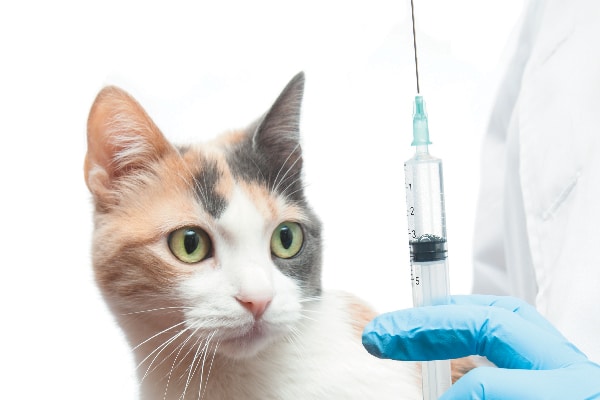In fact, there are answers to the question, “How often do cats need shots?” but they’re not very satisfying. Some plausible answers to the question, “How often do cats need shots?” are … It depends. Nobody knows.
The correct answer to, “How often do cats need shots?” is it varies depending upon life stage, lifestyle, geographic location, and immune system function.
People who seek a simple answer no doubt will be put off at this point. Although there is no straightforward, simple answer to, “How often do cats need shots?” there are some guidelines that can help to make sense of cats and vaccines, as well as cats and preventative measures.
How often do cats need shots & other preventative treatments?
1. How often do cats need flea prevention?
The question, “How often do cats need shots?” arose out of the context of flea prevention. Do all cats require flea preventatives, or are they more important for outdoor cats? Many people believe that fleas are contagious and are transmitted from pet to pet. Although a flea-infested cat may spread the infestation to any cat with whom he comes into contact, remember that fleas, although thoroughly detestable, have a remarkable capacity for spreading and surviving. Fleas can roam freely and can make their way into houses under their own steam. Therefore, indoor-only cats are at risk of flea infestation even if they do not come into contact with any other animals.
This does not necessarily mean that every cat requires a monthly flea preventative. Cats with no skin problems and no visible flea infestation can often get by with only occasional applications of flea preventatives. So, in short, flea prevention can be considered optional for all cats, but especially for indoor cats.
Be aware, however, that fleas are insidious, and it is not uncommon for cat owners to be unaware of significant infestations on their pets. Modern flea preventatives generally are safe, and fleas can cause all sorts of health problems. Therefore, unless you really know how to monitor for fleas, it’s better to err on the side of using flea preventatives rather than risking an infestation.
2. How often do cats need shot heartworm prevention?
How about heartworm prevention? Heartworm disease is spread by mosquitoes, which are perfectly capable of making their way indoors. Although outdoor cats are more likely to be bitten, indoor-only cats have the potential to be infected with these serious parasites. The American Heartworm Society recommends heartworm prevention in all cats. And remember that most heartworm preventatives also protect against intestinal worms, which can spread to humans.
However, heartworm is more common in some areas than in others. Many cat owners elect against heartworm prevention, especially for indoor-only pets. The simplest answer is that there is no simple answer.
3. How often do cats need vaccine booster shots?
Although there also is no simple answer to the question, “How often do cats need shots?” I am happy to report that there is an easy answer to the related question of whether indoor cats need booster shots every year. That answer is no.
The importance of feline vaccination is roughly inversely proportional to age. Kitten shots are phenomenally important, and unvaccinated kittens succumb to feline panleukopenia at high rates. I therefore recommend that all cat owners diligently have their cats vaccinated (with the so-called FVRCP) at 6-8 weeks, 10-12 weeks, and 14-16 weeks. A booster should occur at one year of age. I do not recommend that any cat receive subsequent boosters any more often than every three years; many owners of indoor cats elect a 5-to-7-year period.
The FVRCP is the most important vaccine kittens receive. There are two other vaccines that are in common use. One protects against feline leukemia, or FeLV. Indoor cats are not at risk of contracting FeLV. Therefore, as long as there is no chance of escape, indoor cats don’t need the vaccine for FeLV at all.
4. How often do cats need shots to protect against rabies?
The final common vaccine in cats protects against rabies. I have written many times that rabies is the most deadly infectious disease of both cats and humans. Truly, there is no disease that should be more dreaded. Rabies is spread through direct contact with infected (rabid) mammals. Could an indoor cat be exposed to rabies? It is not likely but it is theoretically possible — I have heard of rabid bats flying down chimneys or through open windows.
Should the owner of an indoor cat vaccinate his pet against rabies? That depends upon a number of factors, including your tolerance for risk, local laws (which sometimes mandate rabies vaccination in cats), and a cat’s likelihood of biting people (if your cat bites someone, your life — and your cat’s life — will be much easier if your cat is vaccinated against rabies).
Some final things to consider when thinking, “How often do cats need shots”?
Finally, one must consider the risk of adverse vaccination events in cats. Cats are at risk of cancers called injection site sarcomas. Although vaccines have saved countless feline lives, they also have a non-negligible potential to cause harm.
So, what is a concerned cat owner to do? No honest person can offer a clearly defined thesis on the matter of vaccines and regular parasite preventatives in cats. But I have been very consistent over the years with the following recommendation. Here it is: Find a good vet and talk it over. A good vet will recognize the complexities of every cat’s situation, and will take the time to help you tailor a protocol to your and your cat’s individual needs. Beware of any person who makes the subject sound simple — in truth, it is anything but.
Thumbnail: Photography ©Maica | Getty Images.
Read more on feline vaccines:





